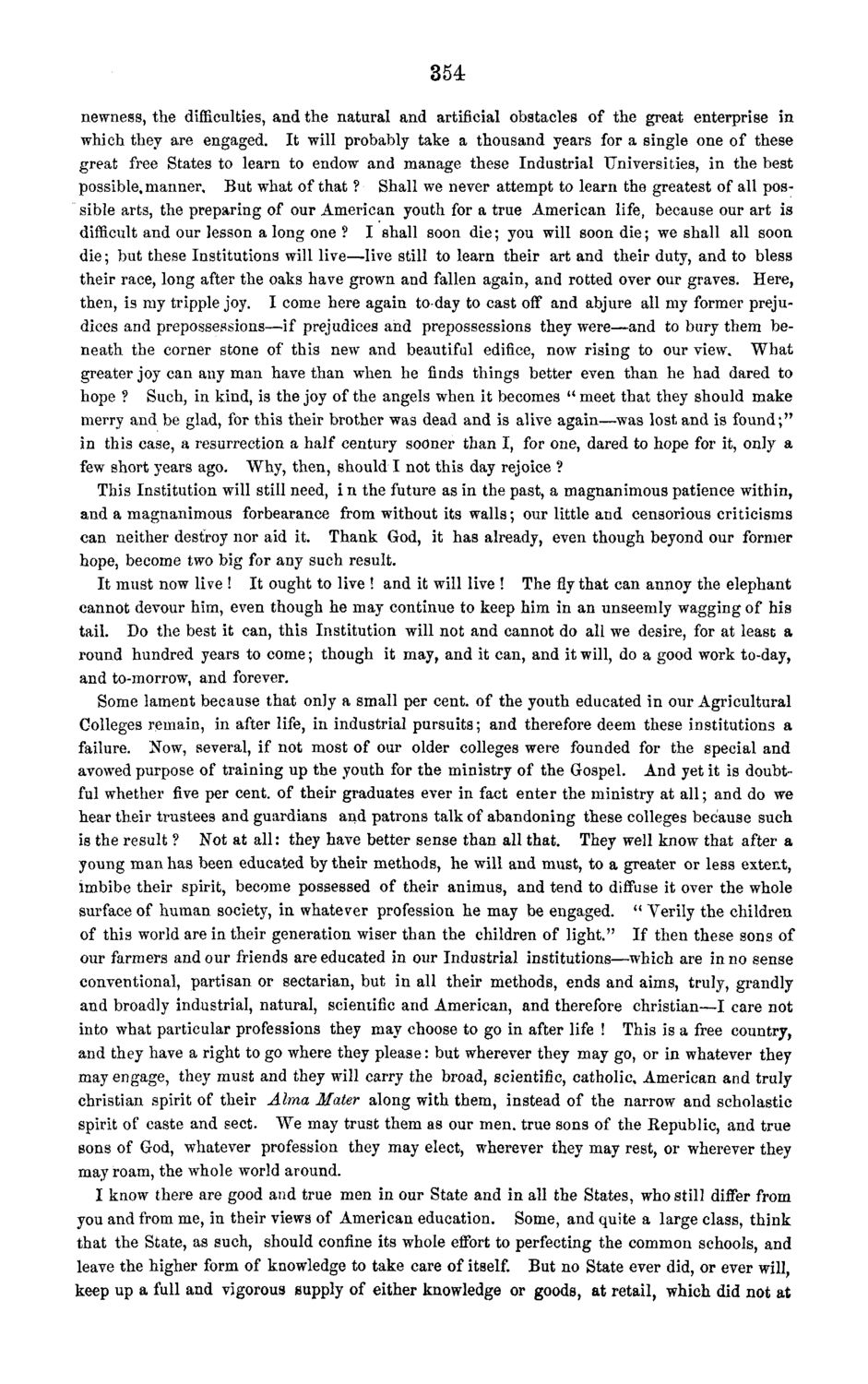| |
| |
Caption: Board of Trustees Minutes - 1871
This is a reduced-resolution page image for fast online browsing.

EXTRACTED TEXT FROM PAGE:
354 newness, the difficulties, and the natural and artificial obstacles of the great enterprise in which they are engaged. It will probably take a thousand years for a single one of these great free States to learn to endow and manage these Industrial Universities, in the best possible,manner. But what of that ?• Shall we never attempt to learn the greatest of all possible arts, the preparing of our American youth for a true American life, because our art is difficult and our lesson a long one ? I shall soon die; you will soon die; we shall all soon die; but these Institutions will live—live still to learn their art and their duty, and to bless their race, long after the oaks have grown and fallen again, and rotted over our graves. Here, then, is my tripple joy. I come here again to-day to cast off and abjure all my former prejudices and prepossessions—if prejudices and prepossessions they were—and to bury them beneath the corner stone of this new and beautiful edifice, now rising to our view. What greater joy can any man have than when he finds things better even than he had dared to hope ? Such, in kind, is the joy of the angels when it becomes " meet that they should make merry and be glad, for this their brother was dead and is alive again—was lost and is found;" in this case, a resurrection a half century sooner than I, for one, dared to hope for it, only a few short years ago. Why, then, should I not this day rejoice ? This Institution will still need, i n the future as in the past, a magnanimous patience within, and a magnanimous forbearance from without its walls; our little and censorious criticisms can neither destroy nor aid it. Thank God, it has already, even though beyond our former hope, become two big for any such result. It must now live ! It ought to live ! and it will live ! The fly that can annoy the elephant cannot devour him, even though he may continue to keep him in an unseemly wagging of his tail. Do the best it can, this Institution will not and cannot do all we desire, for at least a round hundred years to come; though it may, and it can, and it will, do a good work to-day, and to-morrow, and forever. Some lament because that only a small per cent, of the youth educated in our Agricultural Colleges remain, in after life, in industrial pursuits; and therefore deem these institutions a failure. Now, several, if not most of our older colleges were founded for the special and avowed purpose of training up the youth for the ministry of the Gospel. And yet it is doubtful whether five per cent, of their graduates ever in fact enter the ministry at all; and do we hear their trustees and guardians and patrons talk of abandoning these colleges because such is the result ? Not at all: they have better sense than all that. They well know that after a young man has been educated by their methods, he will and must, to a greater or less extent, imbibe their spirit, become possessed of their animus, and tend to diffuse it over the whole surface of human society, in whatever profession he may be engaged. " Yerily the children of this world are in their generation wiser than the children of light." If then these sons of our farmers and our friends are educated in our Industrial institutions—which are in no sense conventional, partisan or sectarian, but in all their methods, ends and aims, truly, grandly and broadly industrial, natural, scientific and American, and therefore christian—I care not into what particular professions they may choose to go in after life ! This is a free country, and they have a right to go where they please: but wherever they may go, or in whatever they may engage, they must and they will carry the broad, scientific, catholic, American and truly christian spirit of their Alma Mater along with them, instead of the narrow and scholastic spirit of caste and sect. We may trust them as our men. true sons of the Republic, and true sons of God, whatever profession they may elect, wherever they may rest, or wherever they may roam, the whole world around. I know there are good and true men in our State and in all the States, who still differ from you and from me, in their views of American education. Some, and quite a large class, think that the State, as such, should confine its whole effort to perfecting the common schools, and leave the higher form of knowledge to take care of itself. But no State ever did, or ever will, keep up a full and vigorous supply of either knowledge or goods, at retail, which did not at
| |